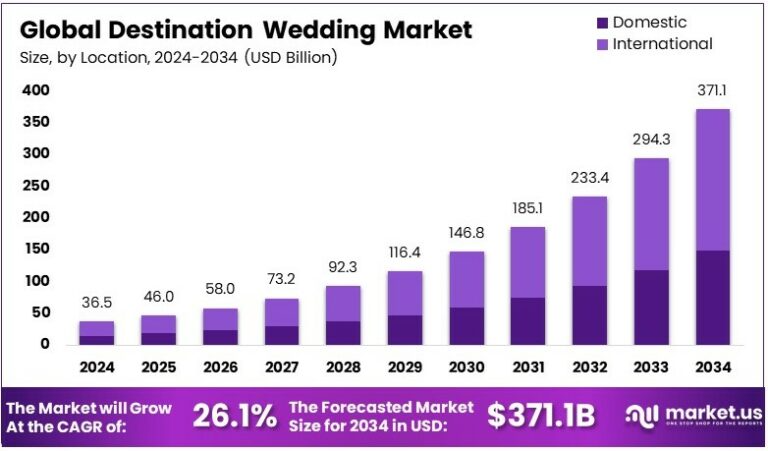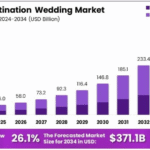Introduction
The destination wedding market has evolved into a vibrant segment of the global wedding industry, captivating couples seeking an extraordinary way to celebrate their union. No longer confined to hometown venues, these celebrations often unfold against panoramic landscapes—clifftop villas, secluded islands, or opulent palaces. The appeal lies in their duality: a matrimonial ceremony and an immersive travel experience for guests. Couples increasingly value the intangible—memories forged under foreign skies—over the tangible trappings of traditional weddings. This shift has propelled the market into a realm where romance and tourism intertwine seamlessly.
For more info please visit: https://market.us/report/destination-wedding-market/
Market Dynamics and Growth Drivers
Several forces converge to propel the growth of the destination wedding market. Rising disposable incomes empower couples to allocate larger budgets toward unique and extravagant celebrations. The parallel ascent of luxury travel trends reinforces this shift, with premium resorts and curated experiences becoming synonymous with wedding festivities. Social media plays an instrumental role, transforming personal ceremonies into public showcases. Platforms like Instagram and Pinterest fuel aspirational desires, as couples envision their own idyllic celebrations inspired by meticulously curated imagery. Additionally, seasonal and cultural factors—such as avoiding monsoon rains or aligning with auspicious dates—exert significant influence over planning decisions.
Preferred Destinations and Regional Insights
From sun-kissed shores to historic grandeur, preferred destinations vary widely but share a common denominator: the ability to enchant. Coastal havens such as the Maldives, Bora Bora, and Santorini draw those enamored with aquamarine vistas. Conversely, heritage-rich locales like Tuscany, Rajasthan, and Prague cater to couples seeking an aura of timeless sophistication. A fascinating trend is the emergence of lesser-known gems—destinations like Puglia, Lake Bled, or Tulum—offering exclusivity and distinctiveness. These new entrants are not only more cost-effective but also provide a sense of novelty for couples eager to distinguish their celebration from the commonplace.
Key Consumer Demographics and Behavioral Trends
Millennials and Gen Z constitute the most influential cohorts in the destination wedding arena. These generations prioritize experiential richness over conventional norms, often favoring ceremonies infused with local culture, artisanal gastronomy, and bespoke décor. Multicultural unions are also reshaping the market, blending rituals from diverse traditions into a single celebration, thereby expanding demand for culturally adaptable venues and services. Personalization remains paramount—every detail, from monogrammed welcome kits to curated playlists, is tailored to reflect the couple’s narrative. Such demands are driving service providers toward hyper-customization as a competitive differentiator.
For more info please visit: https://market.us/report/destination-wedding-market/
Challenges and Market Restraints
Despite its allure, the destination wedding market faces notable impediments. Economic volatility and fluctuating exchange rates can rapidly inflate budgets, creating uncertainty for planners and couples alike. Regulatory hurdles, including visa requirements, event permits, and local marriage laws, introduce layers of complexity, especially in cross-border arrangements. Environmental sustainability has emerged as a pressing concern, as high-volume travel and resource-intensive celebrations draw scrutiny. These factors compel stakeholders to balance opulence with ecological responsibility, fostering a shift toward greener, low-impact wedding models.
Future Outlook and Opportunities
The trajectory of the destination wedding market points toward innovation and diversification. Technological integration—through virtual planning tools, 3D venue walkthroughs, and AI-driven guest management—is streamlining logistics for far-flung events. Eco-conscious weddings, featuring locally sourced materials, carbon offset programs, and conservation partnerships, are gaining momentum among ethically minded couples. Furthermore, immersive cultural experiences—such as multi-day festivals incorporating regional music, cuisine, and traditions—are redefining the wedding narrative. This dynamic market continues to offer fertile ground for vendors, from boutique planners to luxury hospitality brands, to expand their footprint and craft experiences that transcend the ordinary.






